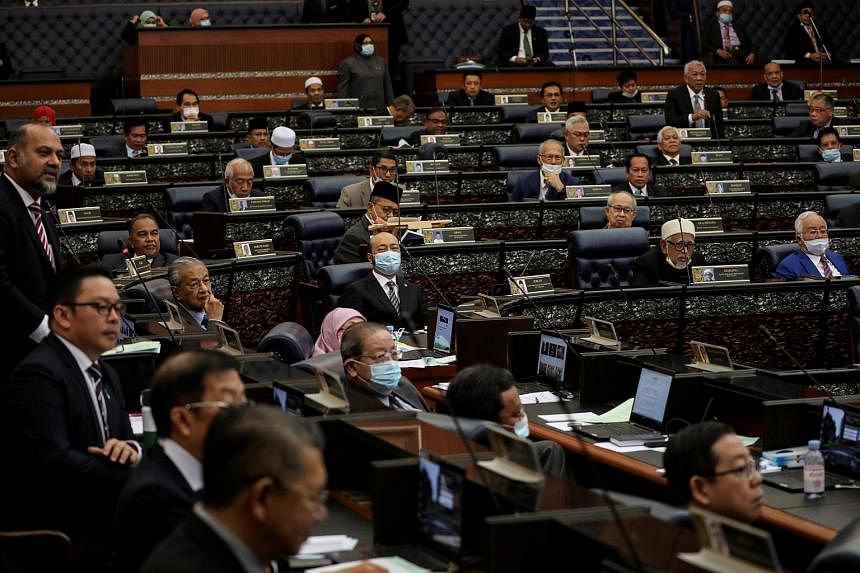KUALA LUMPUR - The Malaysian government tabled its revised anti-party hopping legislation in Parliament on Monday (July 18), just a fortnight before the expiry of its pact with the opposition bloc Pakatan Harapan (PH) to hold off calling elections.
The Bill is meant to stem party defections, a major cause of political instability in previous administrations. It is one of the key conditions in a confidence and supply agreement (CSA) between Prime Minister Ismail Sabri Yaakob and PH signed in September 2021.
Under the CSA, both sides agreed that Parliament would not be dissolved before July 31, delaying prospects of a snap poll till that date.
Defections had caused PH to lose its federal administration and also its administration in five states since the 2018 general election.
The anti-party hopping Bill was revised based on recommended amendments by a bipartisan Parliamentary Special Select Committee, which has been deliberating on it for more than two months.
The revised Bill needs support from a two-thirds majority, or 147 MPs in the 222-seat lower house. Two seats are currently vacant.
Datuk Seri Ismail's government only has 116 MPs - or a six-seat majority - and needs the backing of opposition MPs to pass the amended Bill.
The legislation was initially tabled in April this year, but a vote was deferred, as many MPs had reservations about its wording and implications.
A key concern is that the Bill could restrict lawmakers' freedom of association beyond party hopping. MPs on both sides of the political divide wanted specific references to party hopping or defections so that the legislation cannot be used to curtail political opposition.
The revised Bill includes a newly created Article 49A that provides for a recall election should an MP leave his seat or switch party. However, a recall election will not apply to an MP who is expelled from a party.
Other amendments include abolishing a provision that bars MPs who vacate their seats from contesting for public office for five years, and giving states the power to amend their own Constitutions to bar defections.
The revisions, however, will not apply to en-bloc defections - similar to the ones led by former premier Muhyiddin Yassin's Bersatu party from the PH coalition in 2020, collapsing the federal government.
The select committee, in its note accompanying the proposed amendments, said that the revised law will not apply to any post-election coalition agreements between political parties.
The Bill is set to be debated and voted on next week in Parliament. If passed, it would go through senate approval, and could come into effect as early as September.
Singapore Institute for International Affairs senior fellow Oh Ei Sun told The Straits Times that the new amendments made more detailed distinctions of elected representatives - such as those who left their parties on their own accord and those who were expelled - and punishes only the most egregious form of defection. This might lead to the Bill being passed more readily with a supermajority, he said.
However, Dr Oh noted that the amendments state that MPs who are sacked from their parties for crossing the aisle or do not follow party directives do not need to vacate their seats. This creates a loophole that could allow an MP to openly declare support for another party and not lose the seat.
"If I were drafting the law, I would say those who are elected under a party logo must stay loyal to that party. If declaring support for anybody other than who the party supports, then you must vacate (your seat)," he said.
Mr Ismail is under pressure from a faction in his party Umno to call for early elections this year, as soon as the CSA's July 31 deadline passes. However, PH has indicated a willingness to extend the pact to hold off polls, which must be held by September 2023.
Under the CSA, PH agreed to back Mr Ismail's government in key legislations, such as supply Bills and constitutional amendments, provided that it was consulted. The government also agreed to make several key reforms that would involve constitutional changes. The lowering of voting age from 21 to 18 years old and the implementation of automatic voter registration came into force late last year.
Another key condition - a Bill to limit the prime minister to two terms - is yet to be tabled.
The CSA has helped Mr Ismail lead a loose coalition of political rivals with a single-digit majority since August last year, after Tan Sri Muhyiddin resigned as prime minister after only 17 months on the job. Mr Ismail is the third Malaysian PM since the 2018 elections.


